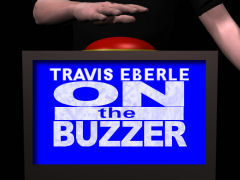|
L-U-N-A-C... Aww, Nuts -
May 10
On May 5, a personal friend
of mine restored my enjoyment of the game show "Lingo."
I had given up on the show entirely; there was nothing
in it anymore. Big ups to Jason and Jacky for winning
$5,000, because it is likely the last episode I'll
watch.
"Lingo" is not a terribly hard game to grasp: players
guess a five-letter word, and are told which letters are
in the word, and which letters are in the proper
position in the mystery word. Armed with that
information, teams have five guesses with which to guess
that word. Time and time again I will see a team guess
"STEAK," find that only the S is in the right position,
and then they'll guess "STATE," gaining nothing in the
process. Something as elementary as guessing 'new
letters' is a strategy that precious few teams consider.
Those are the teams that are going to win the money, but
they are few and far apart. The contestant coordinators
choose which players will make it to the show, and they
select telegenic people and not good players. All this
time I was under the impression that home viewers wanted
to watch people just like them, but what do I know, I'm
just one viewer.
Then comes the game. I'm not crazy about game shows that
rely so much on luck, but I'll accept it in small doses.
That said, the reward for solving a word should be that
you get to fill in spots on the board, not that you're
forced to turn over control to the other team. It makes
no sense. A team that is able to keep control by solving
the words in play should not lose control because of
some random element added to make the game 'more
interesting.' It does the exact opposite: it gives
poorer teams a fighting chance when they should have
none. It is a pointless addition to what could be a fine
game.
The bonus round is supposed to be the big climax of the
show, but Bonus Lingo completely fails to build up any
sort of tension at all. With two minutes, good teams are
able to rattle off at least a half-dozen words, and poor
teams are lucky to solve one or two. Good teams will
almost always win the $5,000; and bad teams surely
won't. If you're going to base the show on pulling balls
from a bin, there should be a bit more variance than
that. I don't know what the solution would be, and if I
did, I wouldn't share it, because they aren't paying me
for that. One thing that doesn't solve anything is a
progressive jackpot for a one-ball lingo. Once the first
ball is drawn, the big money goes away and it's $5,000
or nothing. That 'big money moment' lasts for all of
five seconds, and there's nothing that teams can do to
improve their lie. A good team can only set their sights
on winning $5,000, which is unfortunate, because some
good teams could have won lots more with different
rules.
Lingo just might be GSN's highest rated program, but
it's far from the best game. For that reason, I've moved
on. That's too bad, too, because it has some of the best
play-along elements in the genre. I had more I was going
to cover, but it's not really worth my time. There's
better stuff on television.
Travis Eberle can spell five-letter words with the
best of 'em. Fill in the blanks at traviseberle@gmail.com. |

